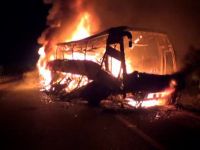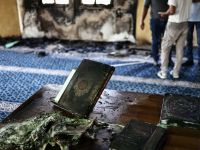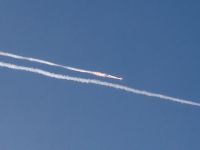US Defense Secretary William Cohen warned Saturday during a Gulf tour that the Israeli-Palestinian conflict could run out of control and spread into neighboring countries.
"The problem is that there is so much violence going on in the Middle East. Every day brings a new funeral, every funeral brings outrage, until someday it goes out of control," he told US soldiers in Qatar.
Cohen said the violence which has raged in the Palestinian territories since the end of September at a cost of more than 240 lives, most of them Palestinians killed by Israeli gunfire, could spread to other countries in the region.
"When you have American soldiers on duty and on call, it gives them (the Gulf states) a level of comfort," he told the soldiers at the Qatari base of Al-Saliyeh near Doha where the US military has positioned arms, including 100 tanks.
Around 120 US soldiers and 40 of their dependents live in Qatar.
Cohen, on the fourth leg of a Middle East tour after Bahrain, Oman and the United Arab Emirates (UAE), was to meet the Qatari emir, Sheikh Hamad bin Khalifa al-Thani.
In Abu Dhabi, he held talks earlier the same day with United Arab Emirates (UAE) armed forces chief of staff, General Sheikh Mohammad bin Zayed al-Nahyan, and Abu Dhabi's Crown Prince Khalifa bin Zayed al-Nahyan.
The UAE was a longstanding "good friend" of the United States and "the Middle East crisis has not derailed our relationship," one official told reporters travelling with Cohen.
"They (the UAE) want the US to stay involved. They understand that the only option is to stop violence and to go back to the negotiating table. They ... are supporting our efforts," Defence Department spokesman Ken Bacon said.
Around 300 US aircrew involved in "Operation Southern Watch" to enforce a no-fly zone over southern Iraq are stationed in the UAE, according to US sources. And its port of Dubai is used by the US Fifth Fleet which helps enforce sanctions on Iraq.
Bacon said the UAE was interested in buying US-built Apache helicopters and wanted the return of US sailors who used Dubai as a liberty call up until last month's bombing of the USS Cole in Yemen.
US sailors on shore leave spent a total of 50 million dollars a year in Dubai, before a security alert in the Gulf states raised by the October 12 bombing in the Yemeni port of Aden that killed 17 sailors, he said.
Despite the upbeat assessment of ties, the UAE, in contrast to the US tough line on Iraq, is a strong supporter of Baghdad's campaign for a lifting of the embargo imposed for its 1990 invasion of Kuwait.
And the Cohen visit took place under the shadow of the high death toll of the clashes between Israel and the Palestinians.
Newspapers in the UAE, where pro-Palestinian demonstrations have been held as in the rest of the Arab world, have directed their anger over the killings at US support for the Jewish state.
Al-Bayan, a leading daily, on Saturday blasted the West's "flagrant and shameful partiality" in favour of Israel.
"This partiality is apparent in the US position and the current passivity of the Europeans in the face of Israel's brutality in the occupied territories," the paper said in an editorial.
On Sunday, Cohen is to travel on to Saudi Arabia and Kuwait, returning to Oman on Monday for a meeting with Sultan Qaboos, who is celebrating the 30th anniversary of his rule.
The defense secretary will also visit Egypt, Jordan and Israel before returning to Washington on Wednesday – DOHA (AFP)
© 2000 Al Bawaba (www.albawaba.com)







